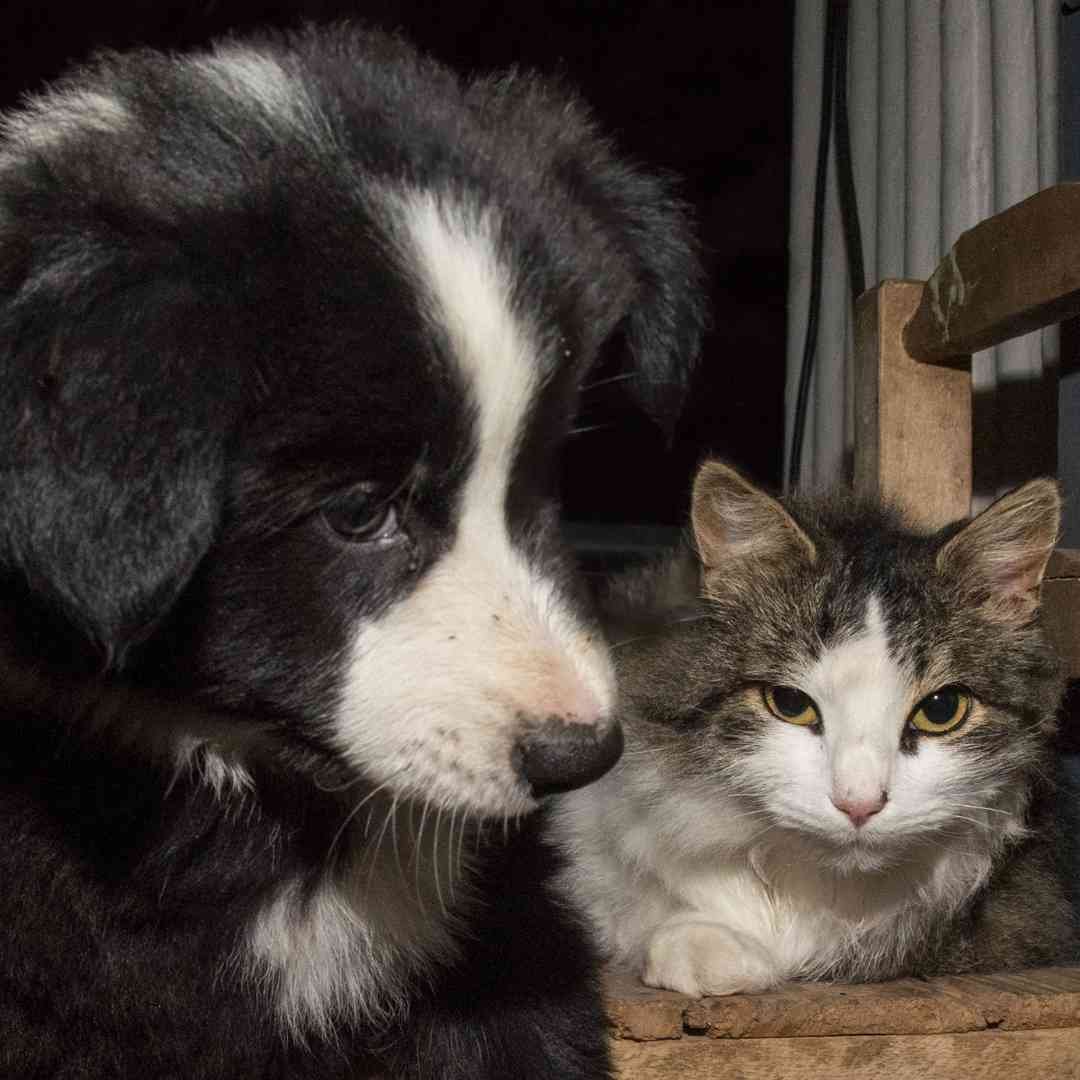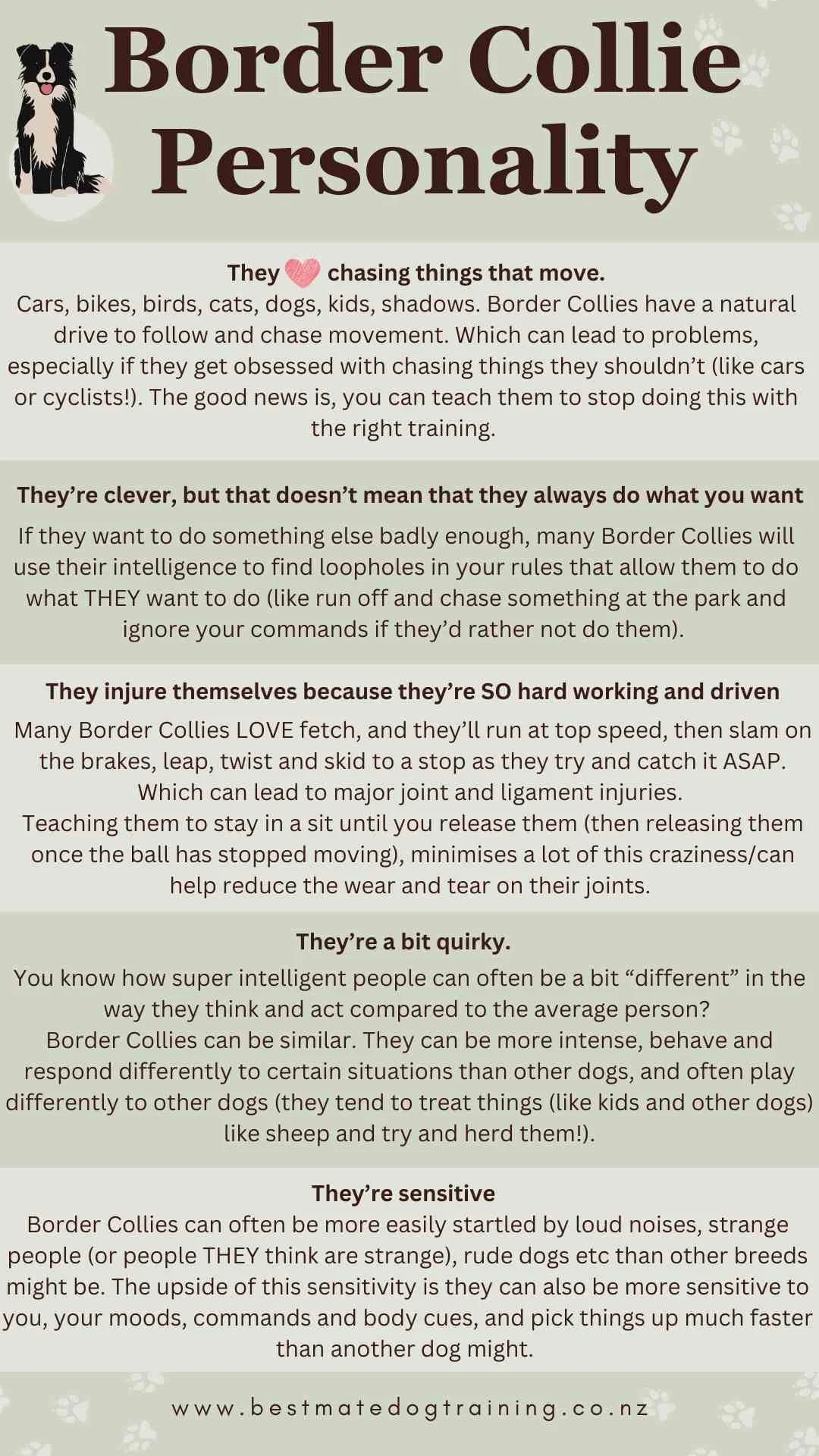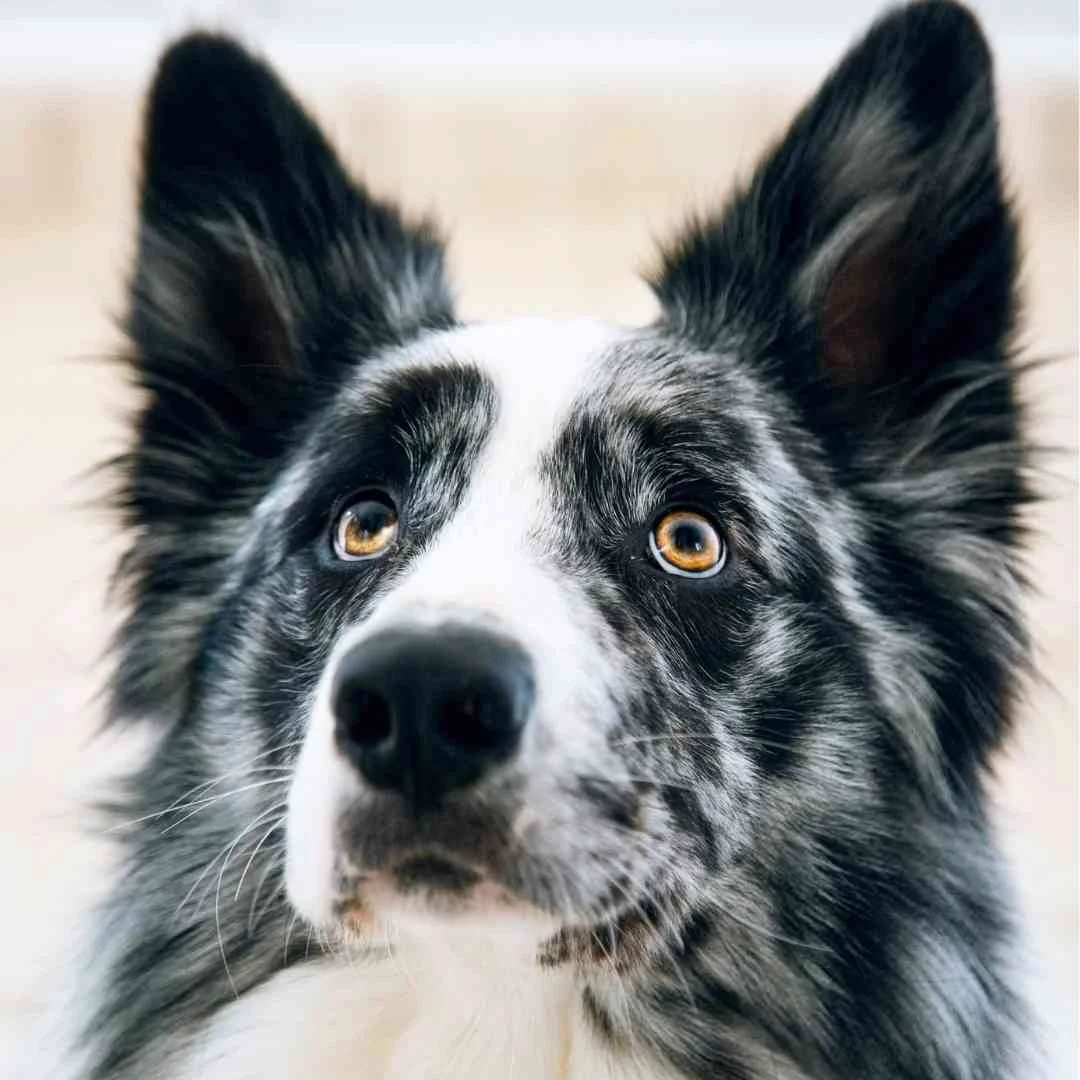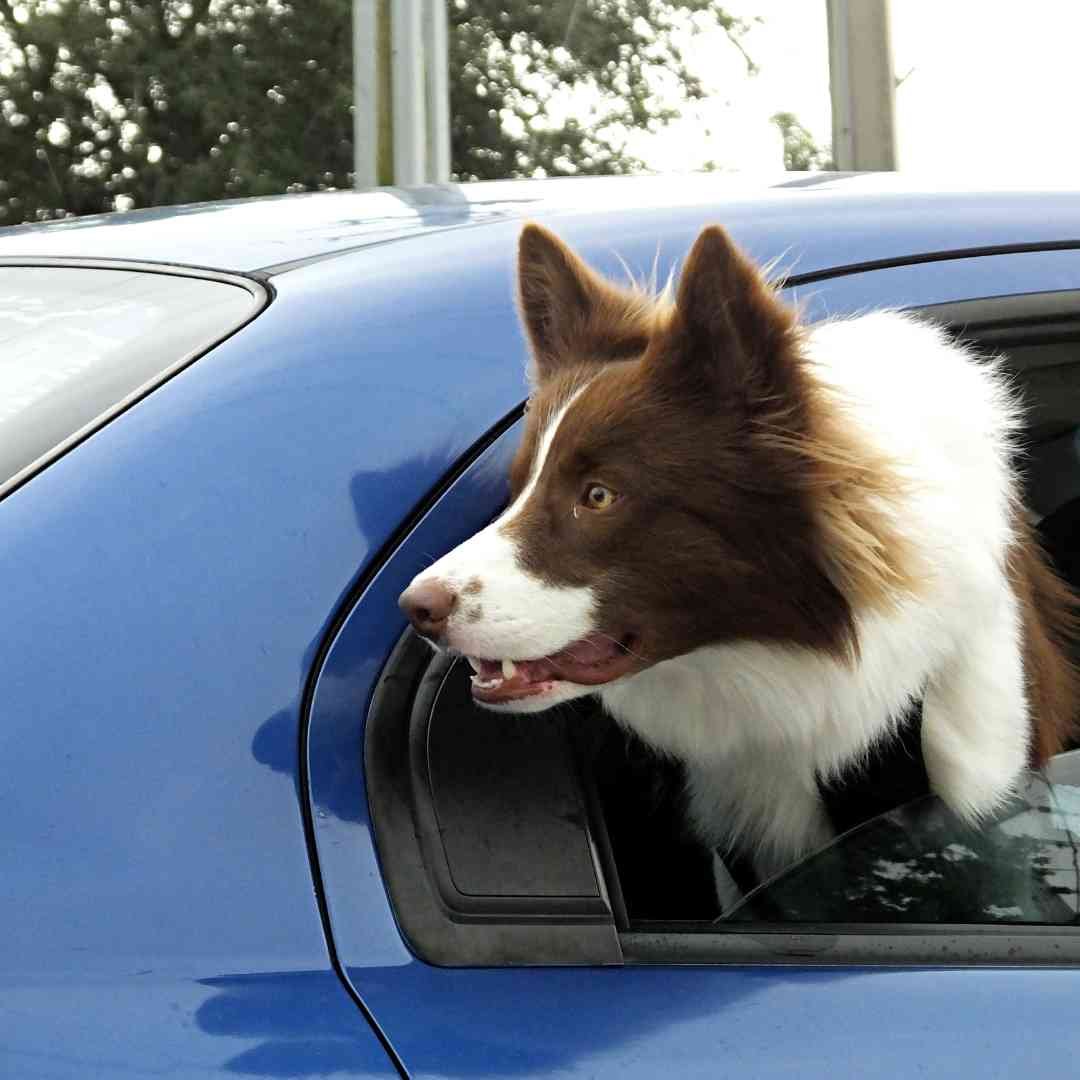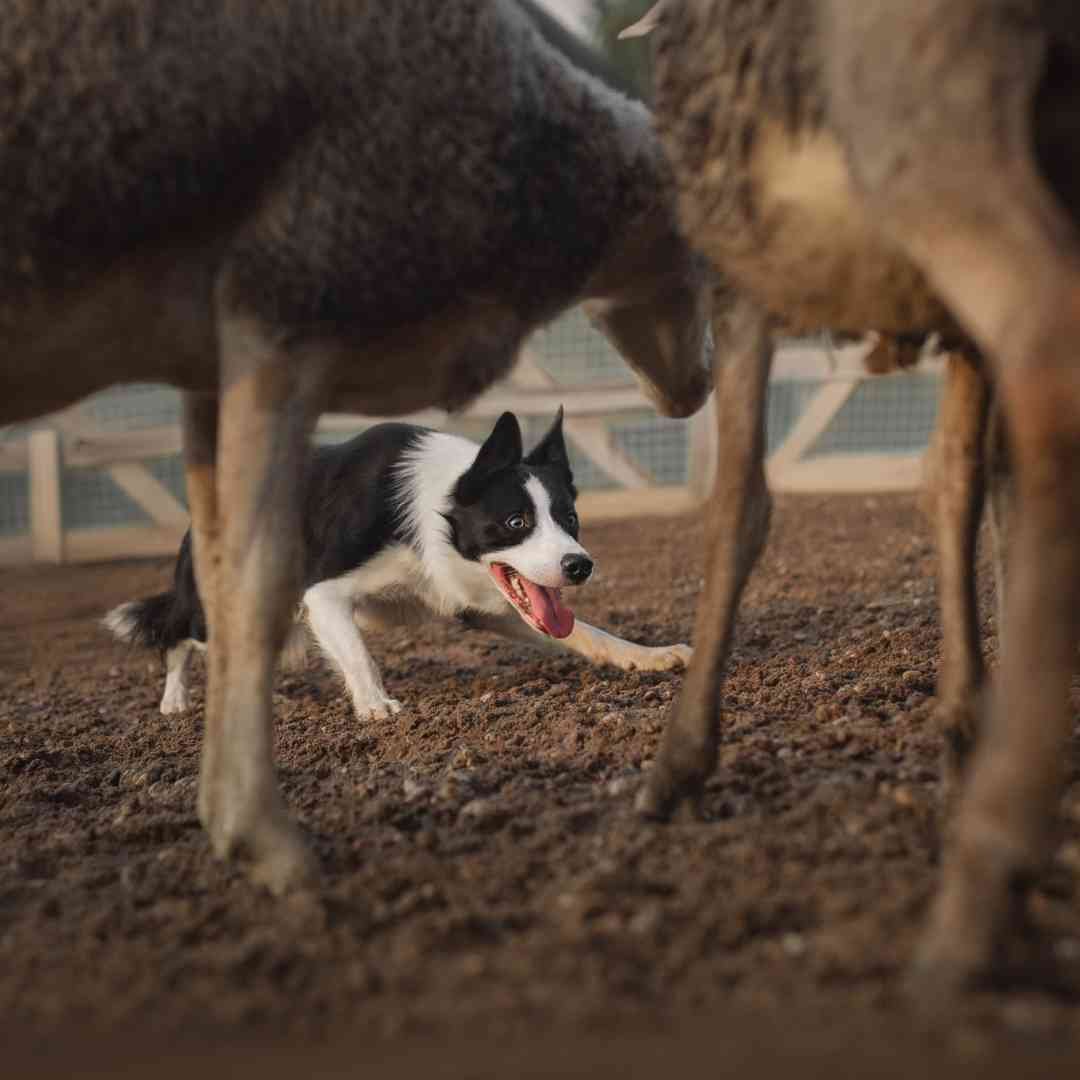Training a Border Collie – Temperament, common behavioural problems and personality traits
Want more insights like this sent straight to your inbox? Click here to get our Free Dog Training Insights.
Border Collies are known to be intelligent and trainable, but they have a few breed traits that can surprise their owners.
Based on the Border Collie breed’s reputation, you’d think that training a Border Collie would be easy.
And in some ways Border Collies are easy to train, BUT the Border Collie breed has a few traits that can cause unexpected hiccups in their training and behaviour, unless you know what to look out for!
These traits (and their unexpected side effects) often aren’t covered in common articles on the border collie breed, which is why we created this in-depth Border Collie Training Guide, including border collie temperament, border collie training tips, & helpful insights into border collie dog training.
Border Collie Dog Training - An Overview
In this Border Collie dog training guide, we’ll be covering:
The Border Collie personality & how it affects training a Border Collie (including points that most articles DON’T cover)
Debunking Border Collie training & breed trait myths
The most common Border Collie training & behaviour problems
Border Collie Dog Training FAQ
The border collie personality & how it affects training your border collie (including points that most articles DON’T cover)
Border Collies Are Super Intelligent And Trainable (but that doesn’t mean training border collies is always easy!)
Most people know this already. Border Collies are the typical breed most people think of when asked to name an intelligent dog breed.
They’re commonly used in dog sports, agility, as well as the more traditional herding and stockwork that they were originally bred to do. Many dog trainers also use Border Collies as their “demo dogs” because their intelligence and trainability makes it easier to teach them impressive tricks.
Border collies are intelligent and bred to work with people, so they tend to pick training up super quickly (as long as it’s clear and consistent).
BUT intelligent dogs aren’t always as easy to train as many people assume.
That’s because they can also use their intelligence to find loopholes in your rules and commands, and use them to do what THEY want to do instead.
Which is totally understandable – both dogs and people are naturally driven to get what they want out of life, so if your Border Collie finds a loophole that lets them do something they really want to, of course they’re going to use it! It’s not necessarily them being deliberately naughty, they’re just doing what works for them.
Which means that if you want to have a well-trained Border Collie, you have to make sure your training doesn’t have any loopholes that can be exploited (more on that later).
Border Collies Are A Working Breed – They Need A Job
Agility can be a great “job” for Border Collies. But there are other options, too.
This catches many people out, because many assume that an hour of physical/mental stimulation or less a day will be enough for their Border Collie.
But Border Collies were bred to run, think, concentrate and perform tasks alllllll day, not just for an hour or two.
Think about it – if a working dog could only concentrate and perform/run for an hour and then needed to sleep it off for the rest of the day, they wouldn’t last long in the working environment.
Border Collies have been selectively bred to work all day, every day and LOVE doing it.
If you don’t give your Border Collie a job, they’ll invent one for themselves, and it will probably be something you’d rather they didn’t do – patrolling the backyard and barking at every bird/passerby, digging massive holes, chasing cars etc.
The good news is, though, that giving them a job doesn’t mean you have to get them out working sheep or competing in agility. You can give working dogs jobs that fit in with your every day life and still have a happy, balanced dog without running them for miles and miles every day.
They do need plenty of physical exercise to keep them happy and healthy BUT many owners of high energy dogs (like Border Collies) create a trap for themselves by using only physical exercise to tire their dog out.
Which means their Border Collie ends up getting fitter and fitter, and therefore needing to go further, run harder and longer to get tired the next time.
So you end up in a vicious cycle of having to exercise your dog more and more just to keep them calm, because you’ve never taught them how to settle themselves.
Which means you end up with a super fit dog, who you can’t tire out properly anymore because you don’t have the time to run them as long and hard as you’d need to, AND who doesn’t know how to settle and is always switch on and into everything…
NOT a good combination!
Luckily, it’s something that can be fixed (and prevented) by using mental exercise to teach them to settle AND use up some of their seemingly endless energy.
And before you think “I’ve got that sorted, my dog does sniff games/tricks/focus games/agility etc”, that’s NOT what I’m talking about when I say “mental exercise”.
What AM I talking about? You’ll find out later on, in the “myths” section…
Border Collies Can Be Aloof And Often Aren’t “Social Butterfly” Dogs
Socialising is super important with Border Collie puppies
Obviously all dogs are individuals and personality can vary a lot within a breed (and even within a litter of puppies).
While some Border Collies ARE social butterflies and love everyone, many are a bit more aloof and can take some time to warm up to new people and dogs.
It’s important to get to know your individual dog and their preferences, so you don’t push things on them (like letting strangers pat them, or strange dogs run up to them) if they’re not keen on those things.
It’s also really important to socialise your Border Collie puppy, especially during the first 16 weeks of their life, while their brain is in the key socialisation development period. This will help them be a more confident, friendly adult later on, rather than fearful or aggressive to new people or things.
It’s important to remember that just like people, not all dogs are social butterflies and the “life of the party” and if you have a more aloof Border Collie, to respect their personality and not force things on them, trying to make them be someone they’re not.
That’s not to say that you can’t make progress with them in that area, or that you have to let them bark/growl etc to people and dogs they see as part of everyday life.
It’s ok for your Border Collie to not love and want to interact directly with everyone they meet, but it’s not ok for them to do the equivalent of hurling abuse at them if they decide they don’t like them.
If you want some help with teaching your Border Collie to not go crazy and bark or growl at people or dogs they meet, that’s something we can help with in our online dog training course, Canine Chaos to Calm.
Border Collies Can Be Prone To Obsessions And OCD Type Behaviours - The Saddest Case I’ve Seen
The saddest behaviour I’ve ever seen is a Border Collie who was obsessed with her own shadow, to the point where nothing else around her “existed” in her world.
Even when she was out in a big paddock, with other dogs running and playing all around her (I met her when I was working at a boarding kennel as a teenager), all she could focus on was her own shadow.
In fact, she was so obsessed with focusing on her shadow, that she repeated the same behaviours, even when she couldn’t see her shadow because it was too dark.
She’d stare at the ground, take two steps to the right, then jump back to the left, back into the spot she’d been standing in. Essentially “pouncing” on her shadow. She’d repeat this over and over and over.
Two steps to the right, hop back, two steps to the right, hop back.
Again, and again and again.
I saw variations of behaviours like this in many Border Collies who came through the kennel, but she is one who has stuck in my mind ever since.
Obsessive behaviours like this tend to be more common in Border Collies and other highly intelligent working breeds (especially herding breeds, because they’re attracted to the movement of light/shadows).
It’s usually a sign that they’ve been left to their own devices for too long, and got bored, then found an unhealthy outlet for their boredom.
The more they’re left to their own devices, the more they default to that outlet for their boredom, until it becomes an ingrained habit, or even obsession.
Eventually, it becomes so bad that even when you DO offer them other outlets for their energy and intelligence (like running around in a paddock with other dogs), they’ll still default to their obsessive behaviour.
This is why it’s so important to only get a high drive, intelligent working breed like a Border Collie if you can commit to giving them everything they need to keep them happy and healthy.
If you have a dog who has already started showing signs of obsessive behaviours, it is often possible to make progress with training, and even stop them completely, but it’s SO much easier to avoid creating the problem in the first place.
Border Collie Temperament & Personality Traits – 5 Things to Remember when Training a Border Collie
Things to remember about the border collie temperament #1: Border Collies Love To Chase Things That Move.
Cars, bikes, birds, cats, dogs, kids, shadows… Border Collies have a natural drive to follow and chase movement. Which can lead to problems, especially if they get obsessed with chasing things they shouldn’t (like cars or cyclists!). The good news is, you can teach them to stop doing this with the right training.
It’s all about developing their self-control and listening ability, so they learn how to contain their impulses and listen to what you’re asking, rather than just impulsively chasing anything that moves.
Things to remember about the border collie temperament #2: Border Collies Are Clever, But That Doesn’t Mean That They Always Do What You Want.
If they want to do something else badly enough, many Border Collies will use their intelligence to find loopholes in your rules that allow them to do what THEY want to do (like run off and chase something at the park and ignore your commands if they’d rather not do them).
Which means that Border Collie obedience training is NOT always the walk in the park many people assume it is (especially when they’re distracted, or really want to do something else).
Check out the section below on “training a Border Collie who doesn’t listen” if this sounds familiar to you and your Border Collie!
Things to remember about the border collie temperament #3: Border Collies Often Injure Themselves Because They’re SO Hard Working And Driven To Chase Balls, Run & Jump.
Cruciate ligament injuries (or similar joint issues) are super common in breeds like Border Collies.
Border Collies can often injure themselves by chasing intensely after toys during fetch. Training can often help reduce this, by getting them to wait for release until the toy stops moving (which is great exercise for their brain, too!!)
This is at least partly because they are so driven and energetic, so when they do an activity, they go ALL in!
Which means when you play fetch with them, they are super intense about running at TOP speed, slamming on the brakes, skidding, leaping, twisting and diving to catch that ball and bring it back ASAP.
Which can easily lead to increased wear and tear on their joints, and often result in major injuries (like rupturing their cruciate ligament).
This can partly be because many Border Collie owners will try and use their weekends/days off to wear their Border Collie out as much as possible, and play massive long games of fetch, and do lots of physical activity on those days. Which, if their dog is less active the rest of the time, can lead to injury because their muscles and joints aren’t conditioned to that extra activity.
One thing I recommend from a training perspective, based on conversations I’ve had with vets and canine physical conditioning experts, is to teach your Border Collie to wait until released when you play fetch with them. This means teaching them a REALLY reliable sit/stay command, where they’ll sit when you throw the ball, then wait until YOU say they can go and get it. Which means you can wait until the ball has stopped bouncing, before releasing them to go and get it.
This way, they’re not leaping around crazily at top speed trying to grab a bouncing ball, and they’ll generally slow down and pick up the ball far more carefully than if they were hot on its heels as it landed.
And before you think you could never get your dog to stay in a sit once you’ve thrown the ball, we teach our course members how to do this ALL the time (most of the time, they didn’t think their dog would be able to do it either, until they saw it with their own eyes!).
Things to remember about the border collie temperament #4: Border Collies Can Be A Bit “Quirky”.
You know how super intelligent people can often be a bit “different” in the way they think and act compared to the average person. Border Collies can be similar. They can be more intense, behave and respond differently to certain situations than other dogs, and often play differently to other dogs (they tend to treat things (like kids and other dogs) like sheep and try and herd them!).
The best approach to this is to understand your dog and their limitations, AND use training to help them be the best version of themselves (often what people assume is just part of their dog’s personality can actually be changed quite a lot with the right training). Training can’t change genetics, but it can make a big difference to how your dog behaves even with the genetic “hand” they’ve been dealt.
Things to remember about the border collie temperament #5: Border Collies Are Sensitive
Border Collies can often be more easily startled by loud noises, strange people (or people THEY think are strange), rude dogs etc than other breeds might be. The upside of this sensitivity is they can also be more sensitive to you, your moods, commands and body cues, and pick things up much faster than another dog might.
Sensitivity to noises, strangers, objects and situations can also be helped through training. They may never be “bomb proof”, but they can often improve a lot with the right training.
Training a Border Collie who doesn’t listen…
Border Collies have a reputation for being highly trainable, but that doesn’t mean it’s always easy to get them to listen reliably.
Many people are not expecting their Border Collie to be difficult to train.
The breed traits of “hard-working, intelligent, quick learners, bred to work with people” etc don’t really go hand in hand with “stubborn dog who refuses to listen unless it suits them”.
So most people expect Border Collie obedience training (and behavioural training) to be a walk in the park.
Which in some ways, it is (they LOVE to learn).
But there are many Border Collie owners who have trouble with their Border Collie not listening to them, or not behaving in the way they’d like.
Which does actually make sense when you stop and think about it.
It’s an evolutionary trait for every animal to look out for yourself and your own best interests (if you sacrifice yourself in favour of others TOO much, you’re not likely to live long enough to breed and pass on your selfless genes).
Which means that dogs, despite loving us and wanting to please us, also want to please themselves.
So, if Border Collies use their high intelligence, it doesn’t take them long to figure out loopholes in your rules and commands that let them do something THEY really want to do…
Loopholes like:
If they ignore your commands, they get to go and chase something fun.
If they jump up on you when your hands are full of shopping, you can’t do anything about it.
If you’re busy getting the kids ready for school in the morning, you’re less likely to notice (or do anything about) them sneakily chewing a shoe, or chasing the cat.
And because they LOVE doing the things those loopholes allow them to, they’ll use those loopholes all day long, until you put a training system in place that closes up the loopholes (which is what we teach using our treat-free training system).
So, if you have a Border Collie who doesn’t listen or behave the way you want them to, don’t despair, it’s actually more common that you’d think AND it’s fixable with the right training system.
In fact, common Border Collie dog training (usually treat or dominance based) approaches can often accidentally CREATE these loopholes, so if you’re following common Border Collie dog training advice to a tee and still having issues with your Border Collie, that might (ironically!) be one of the reasons why.
Border Collie Training Myths
Border Collie Training Myth #1: Border Collies Can’t Settle/They ALWAYS Have To Be Busy.
Teaching your Border Collie to settle and stay still even when they REALLY want to be involved is one of the best ways to tire them out (because it takes so much mental focus to remember to stay still)
Yes, they need a job to do. But sometimes that “job” can be to concentrate on staying still (which actually takes a lot of mental concentration when you just want to be moving/involved with everything!) Training a border collie to stay still can (ironically!) be a great way to tire them out.
As I mentioned before, a lot of Border Collie (and other high energy dog breed) owners get stuck in the trap of using physical exercise to tire their dog out and help them settle.
But the more you use physical exercise to tire your dog out, the fitter they get, and the further you have to take them next time to tire them out again.
Eventually, it gets to the point where you have a super fit dog who needs to run for miles to get remotely tired, and you don’t have enough time in your day to tire them out.
Plus, because they’re bred to work all day, high energy dogs like Border Collies will often bounce back and be ready to go again with an hour or two of physical exercise.
Which is why using mental exercise is one of the most effective ways to tire our a Border Collie (they need physical exercise too, it’s just often not the best answer to a calm, settled dog).
Most people when they hear this reply with something like “oh yes, I use scent games/focus games/teach my dog tricks/work on obedience/give toys stuffed with food etc" to give my dog mental exercise”.
But the truth is, those are NOT the most effective mental exercise strategies (and in some cases can make the problem worse because they hype your dog up, rather than teaching them how to settle).
The best way to tire your dog out mentally is (ironically!!) to teach them to stay still, even when they don’t want to.
Why?
Because staying still (like in a down/drop/bed/place command) even with exciting things going on all around them that they REALLY want to be involved in takes a LOT of self-control.
Self-control is your dog’s ability to hold themselves back from doing something, even when they REALLY want to do it.
So if they’re on their bed, and you’re moving around, doing an activity they want to be involved in/investigate (everyday tasks like cleaning/gardening/playing with the kids often fit this description), it takes a LOT of mental concentration to remember to not act on impulse and get up to investigate.
Which is really tiring, AND has the bonus of teaching them how to settle and stay still, even when they don’t want to (which helps settling in busy, exciting situations become a habit).
Just like how students get really tired at exam time, even though they’re just sitting down, using their brain in a calm, focused but challenging way is one of the best activities for a high energy dog like a Border Collie.
And the bonus is, because everyday activities make great distractions, you can be getting all your daily tasks done, while your dog is practicing self-control and tiring themselves out by learning to stay still even when they want to get up and investigate what you’re doing.
Border Collie Training Myth #2: You Can’t Stop Border Collies From Chasing Moving Things
Chasing cars and other moving objects can be a common issue with Border Collies (luckily you can teach them to stop!)
Reality: Even working border collies (who chase things for a living) have things that they know they’re not allowed to chase (and they don’t chase them, even though they still REALLY want to!).
Things like rabbits and other wild animals, cars, trailers, and the family cat are all things that are REALLY tempting for a Border Collie to chase, yet there are many, many working Border Collies (who chase sheep and cows all day) who have successfully learnt not to chase these things.
There are also many pet Border Collies who started off wanting to chase (or actively chasing) birds, push bikes, cats, cars etc, who have successfully learnt not to – it’s all about using the right Border Collie training approach that teaches your Border Collie to listen and behave, even when they REALLY want to do something else.
Border Collie Training Myth #3: Border Collies All Have The Same Temperament
Like all dog breeds, Border Collies can vary a lot in temperament and behaviour. Some can even be lazy, and even a little bit ”slow” in the brains department…
Dog breeds give a good indication of the typical traits that a dog of that breed TENDS to have. But that doesn’t mean your dog will be a cookie cutter of the breed stereotypes. After all, life would be boring if we were all the same!
Anyone who’s had multiple dogs of the same breed will know what I mean by this. They’re all unique in their own special way, and even siblings from the same litter can be hugely different from one another.
So while it’s important to familiarise yourself with the characteristics of your dog’s breed, don’t be surprised if your Border Collie doesn’t match them exactly.
Most common Border collie training & behavioural problems:
Common Border Collie Behavioural Problem: Jumping Up
Border Collies are energetic and active dogs, who love using physical movement to burn some of that energy!
They can also be quite excitable. Which means that jumping up is a common problem with Border Collies, because it’s a natural fit for their personality and energy level.
Which can obviously be a problem, as a large, jumping dog can easily cause injury (scratches, black eyes, chipped teeth, or just a dog tongue in your mouth that you really didn’t want!!), or intimidate small children.
Luckily, even dogs who are chronic at jumping up can be taught to stop with consistency and the right training approach.
Common Border Collie Behavioural Problem: Chasing Things That Move.
As I’ve already mentioned, Border Collies LOVE chasing almost anything that moves.
Different Border Collies often have their “favourite” thing to chase, and some will just chase anything that moves. Border Collies will often chase cars, bikes, scooters, birds, shadows, cats, or kids.
Luckily, it’s something that can often be changed with training, and (contrary to popular belief) they CAN be taught not to chase things that are inappropriate.
Common Border Collie Training Problem: Ignoring Commands.
Despite having a reputation for being highly intelligent and trainable, that doesn’t mean that training your Border Collie is always a walk in the park.
This is for two main reasons:
One: they can be excitable and highly distracted by things like guests, dogs, birds, cars etc, and their ears can turn off when those things are present.
Two: They can use their intelligence to figure out loopholes (like if you’re busy getting the kids ready for school, they can sneak off and do something they’re not supposed to because you’re too busy to notice)
Common Border Collie Behavioural Problem: Anxiety, Aggression, Nervousness, Nippiness
Being bred to herd sheep and cattle means Border Collies can be prone to being nippy with people, too.
As I mentioned earlier, Border Collies can often be aloof, and a bit “quirky”. This means they’re more likely that other, more happy-go-lucky breeds (like a Golden Retriever), to take offence to someone or something and be aggressive towards it, or nervous of it.
Like many herding breeds, they can also be prone to nipping (as they were bred to use their teeth if needed when herding – nipping heels of cattle or standing up to a sheep if they try and bunt them).
Certain genetic lines in particular can also be extra prone to being nervous or aggressive, because their genes make them less emotionally stable than other dogs (including other Border Collies with better genetics).
The good news is, all of the above common Border Collies behavioural problems can usually be vastly improved (or even solved) with the right training (even if typical, treat based Border Collie dog training approaches have failed despite your best efforts).
If you have a Border Collie with any of the issues we’ve mentioned in this article (selective hearing, obsessions, chasing things that move, jumping up, anxiety, nervousness, reactivity etc), then check out our online dog training course, Canine Chaos to Calm.
Border Collies are one of the most common breeds in our course (which is why I wrote this article!) and they can make amazing progress with the right training system, even when you feel like you’ve already tried every option under the sun and nothing’s worked.
How understanding their behaviour and personality helps with training a Border Collie effectively
Border Collies are amazing dogs. They’re intelligent, athletic, and capable of incredible things, from acing agility trials, learning over 1000 words (true story), through to helping farmers care for and move their livestock for 100s of years.
However, just like a genius isn’t suited to working at the McDonalds drive through their entire life, Border Collie’s amazingness means they’re not suited to a pet life where they’re expected to entertain themselves in a backyard all day, with only a 30 minute walk at the end of it.
The trade off of having an amazing brain and stamina in your Border Collie, is that you have to provide an outlet for it, otherwise they’ll find their own outlet (and it won’t be an outlet you’ll be happy about – think digging craters in your lawn, driving everyone nuts with their barking, chasing things they shouldn’t (cats, cars, birds) and generally being a massive pain in the butt!).
The good news is, giving your Border Collie a “job” can often be as simple as teaching them to hold a command (like down, drop, bed or place) for longer periods of time while other (everyday family) activities go on all around them.
As long as they’re getting physical exercise that meets their needs too, teaching them to stay still when they really want to move and investigate what you’re doing is a great way to exercise their brain (because they have to constantly check themselves and remember to not give into their impulses and move from that spot).
Border Collies can learn not to chase things, even when they REALLY want to.
So, if your Border Collie chases things like cars, cats, bikes, birds, children etc, you don’t need to give up on them and feel like it’s impossible to train them to stop, because you think “Border Collies are bred to chase things”.
They ARE bred to chase things, but that DOESN’T mean they can’t learn the difference between what they can and can’t chase.
That means learning that some things are appropriate for them to chase (like balls, sheep if they’re working dogs), and some things are NOT appropriate for them to chase (like birds, cyclists, cars, trailers, cats, kids etc).
If you’ve tried to do this before without success, it’s likely that you just haven’t found the right Border Collie dog training system yet.
You also need to make sure you don’t create a “weekend warrior” – a dog who is sedentary for most of the week, and then cuts loose in the weekend with crazy, extended periods of fetch, running and jumping, which lead to injuries.
If the things I’ve covered in this article sound familiar for your Border collie, and you’d like some help sorting their selective hearing or behavioural issues (even if you feel like you’ve already tried every option under the sun and nothing seems to work), then check out our online dog training course, Canine Chaos to Calm. I’m almost certain that you won’t have tried training your Border Collie the way that we do it!
Border Collie Training FAQs
-
There are three age “stages” that most Border Collies calm down. 1 year to 18 months is when they grow out of their “naughty teenage” phase and are slightly more sensible (like a human in their 20’s), 3 years is when they tend to calm down and become more mature (like a human in their 30’s). They’re often more calm again once they reach around 9 years old.
-
Border Collies make great pets for active people who want to spend plenty of time training their dog. They LOVE agility and other dog sports, and are great fun to train because they pick things up so quickly.
-
Border Collies can make great family dogs…for the right family. You’ll need to give them LOTS of exercise and mental stimulation, and train them to not “herd” your kids and other pets.
-
Want to know how to get a border collie to listen? Border Collies are one of the most common breeds in our online dog training course. We specialise in teaching dogs to listen and behave reliably, even around distractions, without using treats. So the best way to train your Border Collie to listen, is to join us in the course.
-
Start by building their self-control so they can actually hold themselves back from their natural impulses. Teach them how to listen, even when they want to, and find a training system that allows you to respond appropriately to teach them what you do (and don’t!) want them to do in a given situation. This is something we can help you with.
-
How to get a border collie to stop barking is a super common request, and you’ll find all sorts of tricks and tactics online to stop your dog barking. Problem is, tricks and tactics often don’t work that well when you don’t address the big picture problem (which is that your dog doesn’t know how to listen to you and contain their impulses even when they REALLY want to do something else (like bark). Which is why we teach a step-by-step system that covers EVERYTHING (including barking) so you can address the underlying cause of your Border Collie’s barking, as well as the barking itself.
Border Collie Training Tips
Our weekly dog training insight emails apply to all dogs, including border collies, and help you to understand why your border collie isn’t listening or behaving the way you’d like them to!
Thousands of people look forward to getting these insights in their inbox every week (we get awesome feedback on them!) so if you’d like to be one of them, enter your details in the box below to get our free dog training insight emails, starting with the free guide to the five reasons why your dog doesn’t listen to you (chances are, they’re not what you think!)
